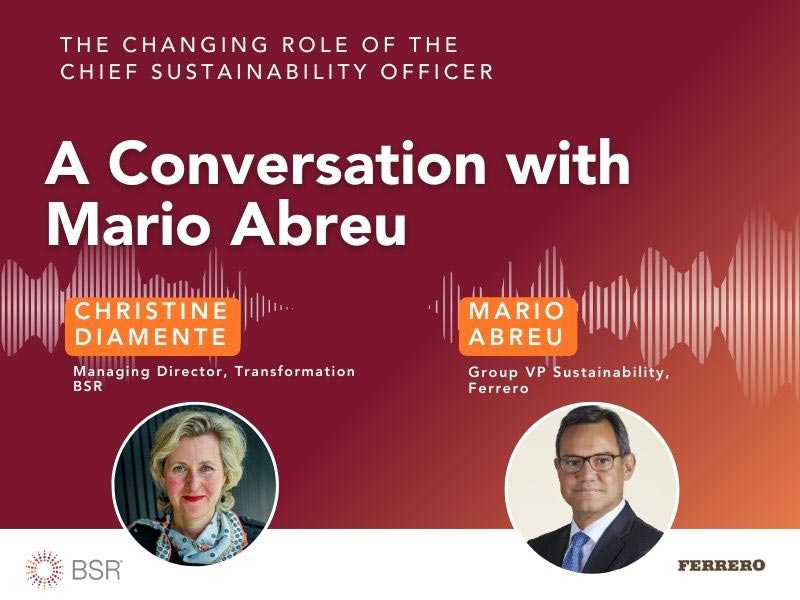
Photo by Benjamin Child
Key Points
- In a time of profound and accelerated change, boards of directors face a wide range of sustainability issues to oversee and ever more complex questions to address.
- Now is the time to act with purpose and create resilient business strategies for the future. Our newly launched and tailored advisory services are aimed at empowering executives and Chief Sustainability Officers (CSOs) to engage, inform, and activate boards on ambitious sustainability strategies.
- We work with Boards and executive leadership as partners to provide strategic direction that strengthens their company’s ability to deliver on ambitious sustainability strategies that enhance long-term value.
In a world that is buffeted by disjunctive change, Boards of Directors face a new reality: their ability to provide effective stewardship and oversight depends on their capacity to act on a diverse array of sustainability questions that are reshaping business:
“How can the company address the risks of climate change and the energy transition? How will they respond to rising expectations to take public positions on questions that once would have been considered too ‘political?’ Can the business meet investor expectations on ESG while also delivering strong financial performance in the near term?”
Unless they take urgent and significant action, most boards will fail those tests.
From a governance perspective, boards are now both discharging long-established duties and being asked to address entirely new questions. As legendary corporate governance attorney Martin Lipton noted:
“The legal rules as to directors’ duties have not changed. What has changed are the expectations of investors and other stakeholders.”
Spotlight on ESG Disclosure Mandates
In addition to existing duties, there is also a raft of new mandates that have put ESG at the front and center for boards. For example, the European Commission Proposal for a Corporate Sustainability Due Diligence Directive (CSDDD) explicitly establishes a “duty to act” on the consequence of their decisions relating to sustainability, climate, and human rights impacts on the company.
The Corporate Sustainability Reporting Directive (CSRD) will also require boards to be a part of the company’s due diligence process and to sign off on sustainability information within a company’s management report.
In the US, the Securities and Exchange Commission’s proposed climate rules would require companies to publish climate-related information in financial filings, including the governance of climate-related risks.
Globally, the International Sustainability Standards Board published exposure drafts that will require climate disclosure in line with the Task Force on Climate-Related Financial Disclosures recommendations and an explanation on board governance and oversight.
This is only the beginning of the raft of new duties on boards addressing climate, social impact, human rights and corporate governance.
Building Future-Proof Business Strategies
Beyond stakeholder expectations and legal duties, it is increasingly apparent that board engagement on sustainability is essential to building resilient business strategies that help companies manage risk, compete in the market, and deliver value for business and society to thrive.
Deeper understanding of sustainability can help a board understand and govern on critical issues, like how climate change is raising the costs of agricultural inputs and driving up insurance prices, or why the company is having difficulty hiring top talent in a region that fails to respect LGBTIQ+ rights, or the impact of potential new regulations on human rights in supply chains.
Furthermore, board engagement on sustainability is valuable in creating a shared understanding and alignment between the board and management. Many CSOs and C-suite leaders have grappled with sustainability topics for years. As boards increasingly turn to sustainability executives for answers, there is an opportunity for collaboration: on the one hand, empowering executive leaders to engage at the board level, and on the other, activating boards of directors to provide effective oversight and strategic guidance.
Key Priorities That Support Strategic ESG Decision-Making
Management and boards have a vital opportunity to collaborate in building resilient business strategies that respond to these new expectations, protect against emerging risks, and pursue new frontiers. To seize the moment, BSR believes there are three critical areas for boards to address sustainability.
- Competencies and Structure: Board members with the right knowledge, competencies, expertise in relevant sustainability topics, and diverse backgrounds are better positioned for effective leadership and resilience.
- Strategy: A clear understanding of how material topics, emerging issues, and stakeholder impacts shape business strategy will be critical for board oversight and “future-proofing” the business for resilience.
- Oversight: Goals, incentives, and accountability are valuable in promoting effective board oversight and alignment with management. Meaningful disclosure is a key aspect of delivering on that oversight.
BSR is proud to build on its 30-year history of working with companies to develop and deliver ambitious approaches to sustainable business, including advice to Boards on approaches that enable them to provide strong stewardship with a positive impact on society. That’s why we’re excited to launch a renewed focus on helping executives and boards align on shared understanding, effective action, and corporate leadership on sustainability.
Our objectives in this work are to empower executives and CSOs to engage, inform, and activate boards on sustainability. We also seek to activate Boards as partners to provide strategic direction that strengthens their company’s ability to deliver on ambitious sustainability strategies that enhance business success.
BSR’s work with boards focuses on offering credible sustainability expertise tailored to each company’s unique context:
- Building competencies and enhancing structure through ESG/sustainability introductions, thematic training, addressing diversity, equity, and inclusion, and institution effective ESG governance throughout the board and organization
- Providing strategic guidance and identifying emerging risks through scenario analysis, stakeholder insights, and the work of our Futures Lab. We also support the development and facilitation of sustainability and stakeholder engagement approaches and advisory panels
- Promoting ESG oversight and transparency by providing guidance on the evolution of regulations, frameworks, and expectations on corporate reporting and disclosure
- Delivering trusted on-going advisory to boards and executives, supporting ongoing efforts and responding to emergent issues
In 2022 alone, boardrooms have scrambled to deal with one ESG crisis after another: the fallout of Russia’s invasion of Ukraine, the rollback of reproductive rights, killer heatwaves, and labor disputes, among others.
Companies are making strategic investments to ensure their businesses are prepared to meet the challenge of the climate crisis, advance equitable societies through their investments, ensure that new technologies and business models have the support of society, and address rising interest from investors, employees, customers and communities.
The question is no longer whether Boards have a role in sustainability; it is how well equipped they are to meet a changing world. The most sustainable—and most successful—businesses will be the ones that address changing needs, expectations, and opportunities. And the most successful Boards will be the ones that ensure these challenges are met.
BSR looks forward to partnering further with Boards and executives from inside and outside the sustainability functions to advance this new era of leadership. If you would like to discuss this topic further, please reach out to our Business Transformation team.
Topics
Let’s talk about how BSR can help you to transform your business and achieve your sustainability goals.









